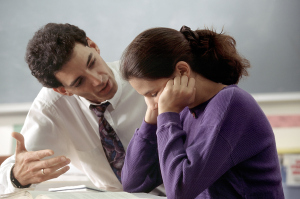School and Career Counselor: Education and Career Information
The school environment has a number of opportunities that exist beyond being a teacher or administrative professional. Most learning institutions have school and career counselor opportunities that help students with advisement on school and career choices they may be interested in. This is a very important position, and can be a great resource for students, parents and school staff. Other names for this type of position include school counselor and career counselor.
What does a school and career counselor do?
A school and career counselor advises students on their academic choices, provides alternatives to help them succeed, aids in their personal and social development and helps them figure out careers that may be of interest to them. They also assist students when they need outside resources and assistance, and may also work with families who are going through crises where the student is being affected academically. You will find school and career counselors in both public and private schools. They also work in institutions of higher learning, career centers, governmental agencies and private alternative solution centers.
School and career counseling has evolved over the years. Additional duties of school and career counselors include collaborations with teachers, administrators and parents to create a successful academic plan for the students, provide individual and group counseling, work with students on a number of life management skills like time management, organization, study habits and healthy eating, identifying possible abuse cases, spearhead initiatives to teach and counsel the student population on topics like drug abuse, bullying, rape, and college planning.
Career counseling is also an important aspect of this position, as many schools have adopted two tracks for students to follow: academic track and vocational track. With a vocational track, students need guidance on selecting a career path that they are interested in. This position assists students in identifying their strengths and other things they are good at to help make an informed decision on which career path would be beneficial for them to explore.
Another component of this position is the social, mental, behavioral and mental problems that must be addressed. Many students fail to communicate when they are having issues at home or with their peers that is affecting their performance in school. A school and career counselor must be able to pinpoint any changes in the student to find the root of the problem.
How much does a school and career counselor earn?
The pay for school and career counselors varies based on education, location, type of facility and experience. According to the Bureau of Labor Statistics, the median annual wage for school and career counselors was $53,610 in May 2012. The median annual wages for the top four industries where you can find individuals working in these positions are elementary and secondary schools (public and private) with an annual average of $60,650; government, with an annual average of $50,710; junior colleges, colleges and universities with an annual average of $46,630; and health care and social assistance facilities with an annual average of $35,590. The top 10 percent of earners usually earn more than $80,000 per year. The industry indicates this position is projected to grow by 12 percent through 2022.
What types of skills are required to be a school and career counselor?
There are a number of skills needed to be effective in school counseling:
Active Listening: Being able to listen to students, parents, teachers and other school staff is essential in being able to understand any problems, or desires of the students when choosing career paths or getting advice on academics or social projects.
Speaking: Being able to communicate with students and other individuals is important in order to be able to understand the needs of the students and be able to convey information that is needed.
Critical Thinking: School and career counselors must be able to apply critical thinking skills in order to assess needs, determine resources and assist students in their academic and career paths.
Compassion: School and career counselors face a number of situations where sensitivity and compassion are needed. There are many stressful and complicated situations where a counselor may need to do some things that are difficult. Being able to empathize with families and students is imperative.
Interpersonal skills: Having interpersonal skills that will allow counselors to work with different types of clients and people. Being able to cultivate meaningful relationships that will allow you to get the job done professionally and efficiently is key.
Internship Requirements
Most states require individuals seeking a position as a school and career counselor to have at least two years of practical teaching experience in the classroom setting. There must also be 2,000 to 3,000 hours of supervised clinical experience under a licensed professional school counselor.
Education Requirements
In order to become a school or career counselor, the first step must be getting a bachelor’s degree in order to become state-certified to practice or teach. Once this has been obtained, and the individual has obtained their certification, they must teach for a period of about two years in the classroom to become familiar with students and their environment.
During this time, most school and career counselors obtain their master’s degree, which is usually a requirement for receiving a license for counseling. Individuals who are pursuing this career path must pass the state exam and keep up with continuing education credits, which are issued on an annual basis. The The National Board of Certified Counselors has all the credentialing information that is needed to progress to the next step.
Many school and career counselors have doctoral degrees in Educational Psychology, especially at the college and university level.
This can be a very rewarding career path for those who want to work in the school system and help students in achieving their goals.






